
TEMPO.CO, Jakarta - The Jakarta provincial government must consider cancelling the plan to restrict vehicles based on odd-even license plate policy.
The system is difficult to be implemented and is quite unlikely to ease traffic congestion in the city if it is not accompanied by improvement of public transport system as a whole.
In several major cities in the world, the restriction of vehicles with the same scheme have been successful.
Beijing, for example, applied the regulation when it hosted the Olympic Games in 2008.
If for example, today vehicles with an even plate number is allowed to operate, tomorrow, only vehicles with an odd planet number is allowed.
The success of this scheme in Beijing was also spread in Guangzhou, China.
In this industrial town, the policy proved to be effective.
It is not surprising if Jakarta Governor Basuki Tjahaja Purnama was interested in the system and intended to apply this regulation to replace the 3-in1 system.
In Jakarta the odd-even plate number restriction policy is planned to be applied on Jalan M.H. Thamrin, Jalan HR. Rasuna Said, and some parts of Jalan Gatot Subroto starting at 07.00-10.00 and 4.30-7.30 pm.
Before the regulation is applied, the Jakarta government is planning to disseminate the regulation for a month from 27 June until 27 July 2016.
It must be remembered that no all cities have been successful in applying this odd-even scheme.
This is what should be studied by Basuki.
Mexico City and Athens for example, have failed to implement it.
The residents are not ready and the public transport system is also not improved.
Eventually, the regulation was not implemented.
The same thing was once also applied in Solo by Joko Widodo when he was still the mayor of Solo.
The fate of this odd-even scheme in Solo was the same at that in Mexico City and Athens: it just disappeared.
Failure in Mexico, Athens, and Solo was supposed to be a serious consideration for Basuki.
Moreover, Jakarta Regional Police are also pessimistic about this regulation.
The odd-even system was considered difficult to be implemented for various reasons.
For example, the officers look at every vehicle. The rule, according to the police, is too easily manipulated, including through falsifying car number plates.
With the public transport system still poor, cheating is very possible.
Another loophole is that the system will increase the purchase of vehicles for certain people.
By having more than one car, one could order that the license plate of the vehicle to the other one odd number, another even number. As a result, the number of cars in Jakarta and surrounding areas will increase.
Before it gets worse, it would be better if the application of these rules is delayed first.
Basuki should learn how to Beijing, Guangzhou, and Bogota (Colombia) successfully implemented the odd-even scheme.
Those cities are making proper preparation.
They also had enough time to disseminate the regulation, so that the public will accept it.
They also set up a good public transport system so that people would switch from private cars to buses, trains, or mass rapid transit (MRT) and others.
The good idea of restricting the number of vehicles on the road should be carefully weighed so as not to be withered before it develops.
Learning from other world cities, Jakarta could use the odd-even scheme to ease congestion, if it is not applied in a hurry.
(*)























